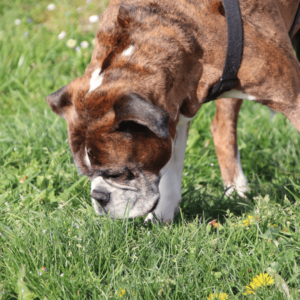Why Dogs Eat Grass? Contemplating the Mystery

For pet owners, observing their furry friends munching on grass can be a puzzling sight. Although dogs are primarily carnivorous, eating grass seems to contradict their dietary preferences. In this article, we explore ten possible reasons why dogs eat grass and explore whether it is a concern.
Instinctive Heritage
The first possible explanation for why dogs eat grass can be traced back to their ancestral roots. Wild canines, such as wolves, often consume grass as part of their natural diet. It serves various purposes, including aiding digestion, providing essential nutrients, and acting as a natural dewormer. Thus, the behaviour could be an instinctive carryover from their evolutionary history.
Digestive Aid
Dogs might consume grass to alleviate digestive discomfort. When dogs experience an upset stomach or feel nauseous, they may instinctively seek out grass to induce vomiting. By triggering this reflex, they can expel undigested food or irritants from their system, providing temporary relief.
Nutritional Deficiency
In some cases, dogs may eat grass due to nutritional deficiency. If their regular diet lacks certain essential nutrients, they may instinctively try to compensate by seeking alternative food sources. Grass contains trace amounts of fiber, vitamins, and minerals that might be missing from their meals. However, it is important to note that grass alone cannot satisfy all its nutritional requirements, so a balanced diet must still be maintained.
Behavioural Enrichment
Dogs, like humans, can experience boredom or seek sensory stimulation. Chewing on grass can provide a form of mental and physical engagement, especially for dogs that spend a significant amount of time indoors. The texture and taste of grass may offer a sensory experience that helps alleviate boredom and prevent destructive behaviour.
Attention-Seeking
Sometimes, dogs may eat grass simply to grab their owner’s attention. If a dog has learned that this behaviour elicits a reaction from its human companion, it is a way to seek attention or engage in play. It is essential to discourage this behaviour and redirect their attention to more appropriate activities.
Taste and Texture is Why Dogs Eat Grass
Another possible reason why dogs eat grass is that some dogs may simply enjoy the taste and texture of grass. Just as humans have different food preferences, dogs may have their own quirky preferences when it comes to exploring and tasting different objects, including grass.
Boredom or Lack of Mental Stimulation
Dogs that are under-stimulated or bored may resort to eating grass as a way to entertain themselves. This behaviour can be a sign that they need more physical exercise, mental enrichment, or interactive playtime to keep them occupied.
Natural Instinct for Foraging
In the wild, canines often engage in foraging behaviour to find additional food sources. Eating grass could be an instinctual behaviour that taps into their natural inclination to search for edible plants and vegetation.
Soothing an Upset Stomach
In addition to inducing vomiting, some dogs may eat grass to soothe an upset stomach or alleviate gastrointestinal discomfort. The grass fibers can provide a calming effect or act as a natural aid in easing digestive issues.
Environmental Influences
Environmental factors such as changes in weather, temperature, or humidity can influence a dog’s desire to eat grass. For example, dogs may seek out grass to cool down on a hot day or satisfy a temporary craving caused by environmental changes.
Is Grass Eating Harmful?
Eating grass itself is generally not harmful to dogs unless it has been treated with pesticides or other toxic chemicals. However, if your dog consumes excessive amounts of grass or exhibits signs of distress, it is advisable to consult a veterinarian. Persistent grass eating could be a sign of an underlying health problem that requires attention.
In conclusion, while the exact reason why dogs eat grass remains somewhat of a mystery, several theories shed light on this peculiar behaviour. Whether it stems from instinct, digestive needs, nutritional deficiencies, or behavioural factors, it is generally considered normal unless accompanied by other concerning symptoms. Understanding your dog’s habits, providing a balanced diet, and ensuring a stimulating environment can help keep them happy and healthy. It’s important to note that while these reasons offer insights into potential explanations, every dog is unique, and the underlying cause of why dogs eat grass can vary. If you have concerns about your dog’s behaviour or health, consulting a veterinarian is always recommended.
Are you interested in finding out what are the 5 rarest dog breeds in the world? Click the link.
2 Comments